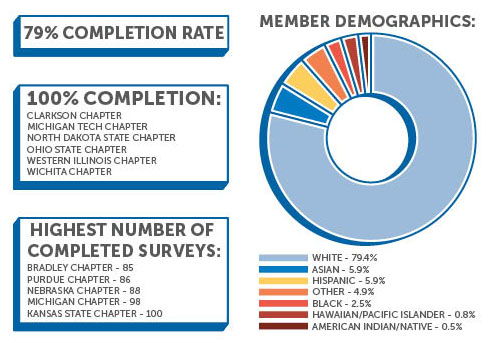Membership Outcomes Assessment
In spring 2017, Delta Upsilon completed Year Two of our Membership Outcomes Assessment. In partnership with Dyad Strategies, LLC, (a research, educational assessment and strategic planning firm), for the second consecutive year, each undergraduate and associate member was asked to complete the assessment survey. The goal: statistically analyze the Fraternity’s impact on a member’s personal development throughout his college experience and use results to tailor educational programming and operations to members’ needs.
In Year Two, results were compared to national collegiate assessment data, as well as DU’s Year One results. Survey questions were specifically designed using DU’s educational learning outcomes, mission and Four Founding Principles to measure personal development in areas including problem-solving, social justice, ethical decision making and conscientiousness. As the Membership Outcomes Assessment continues, the Fraternity is able to see the effectiveness of its programming and to address areas of need.
The 2017 results provide DU with a snapshot of areas of success, as well as areas where continued concentration is needed.

Key Takeaways
Loss Prevention Programming is Working
DU's Loss Prevention programs aim to educate members on a number of topics as a method to prevent risky situations from happening. In the three major areas of Loss Prevention that the Membership Outcomes Survey measures, Delta Upsilon has seen members’ tolerance for hazing significantly decrease, alcohol use go down, and attitudes toward sexual assault improve.
In 2016-2017, major Loss Prevention programming included: Loss Prevention tracks at all DU international educational programs, Chapter Excellence Plan criteria driving more chapter-based programming, participation in It’s On Us, Loss Prevention curriculum in the new Associate Member Education Program, and member participation in GreekLifeEdu (an online program each associate member is asked to take regarding alcohol, hazing and sexual assault).
Associate Member Education Program Has a Positive Impact
2016-2017 was the first academic year in which all chapters were asked to implement the Fraternity’s new Associate Member Education Program. The eight-week program is designed to create an ongoing and dynamic experience for all associate members, providing information on DU’s history, Four Founding Principles, operations, local chapter history, team building, leadership success and more.
Comparing Year One and Year Two results, freshman in Year Two (those who completed the Associate Member Education Program) scored better in almost every construct related to the program than Year One freshman (those who did not complete program unless from a program pilot chapter).
Priorities for the Year Ahead
Strengthen members' problem-solving skills
Following Year One of the assessment, developing members’ problem-solving skills was identified as an area of focus. When a members’ problem-solving skills improve—better ability to identify cause, effects and consequences—the more likely he is score better in other focus areas. In the 2016-2017 calendar year, the Fraternity aimed to increase problem-solving skills by adding more role-playing scenarios into educational programs where members talk through real-life situations and developing activities that build problem-solving. Assessment data showed an increase in problem-solving skills from Year One to Year Two, and the goal is to see further improvement in Year Three.
Develop Brotherhood Based on Belonging
One of Delta Upsilon’s organizational goals is to increase member belonging, or someone’s attachment to the organization and how they identify themselves within Delta Upsilon. Cornerstones to building a brotherhood based on belonging include: trust, authenticity, care, support, and the ability to have meaningful conversations. In the year ahead, the Fraternity would like to see greater improvement in those areas. It is believed that if members feel a greater sense of belonging to DU, many of the areas assessed in the survey will further trend in the right direction.
